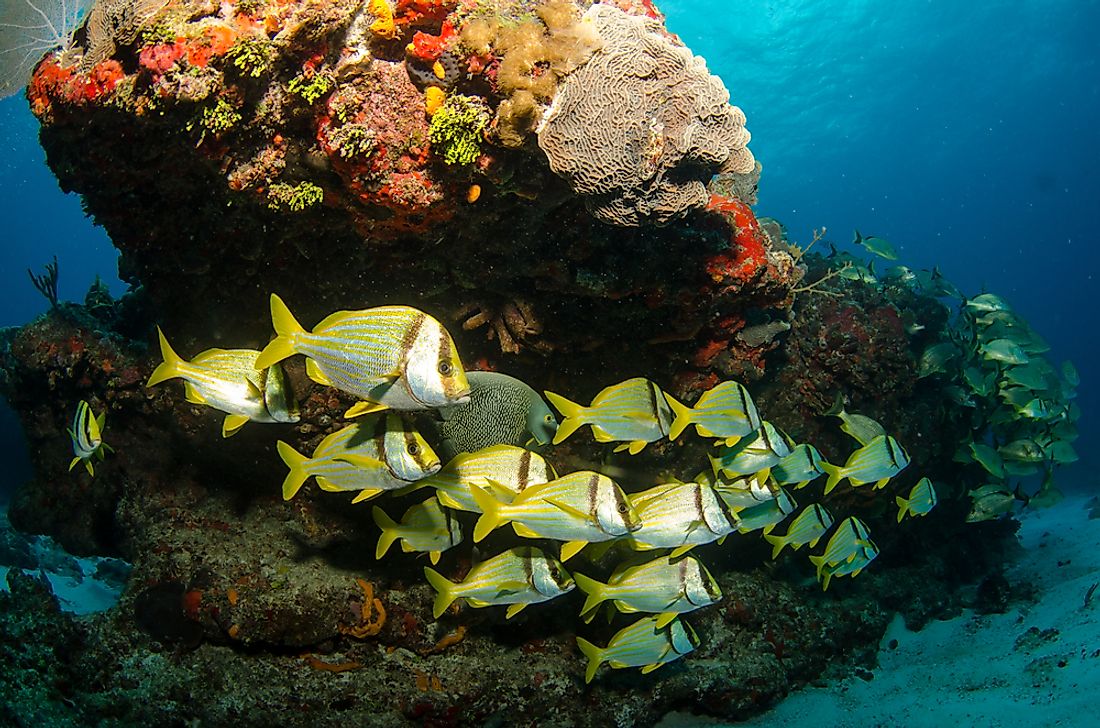Where Is The Mesoamerican Barrier Reef System Located?

The Mesoamerican Barrier Reef, sometimes referred to as the Mayan Reef, is situated in the Caribbean Sea. It is recognized as the largest barrier reef system in the Western Hemisphere and the second largest in the world (after the Great Barrier Reef). The system is an important region of biodiversity, hosting an array of important marine species.
Location Of The Mesoamerican Barrier Reef
The Reef System begins at the Yucatan Peninsula’s northern tip and stretches south for nearly 700 miles through to the Honduran Bay Islands. The system touches on the coastlines of Mexico, Belize, Honduras, and Guatemala. 80% of the reef lies on the coast of Belize where it is referred to as the Belize barrier reef. The Belize barrier reef prides in being the country’s top tourist destination, famous for snorkeling and scuba diving.
Flora And Fauna Of The Mesoamerican Barrier Reef
The Mesoamerican barrier reef system features wetlands, mangroves, coral forms, sea grass, estuaries, and lagoons. The waters of the reef provide habitat to over 500 fish species ranging from lobster, snapper, tarpon, to grouper. Populations of the whale shark have been observed eating and mating. The whale shark is a naturally solitary animal, and it is the biggest known fish making its presence in the reef valuable. Also present in the reef are 350 species of mollusk. More than 65 stony coral species exist in the reef including the brain, black, hard, staghorn, and soft corals. The system supports other wildlife species such as manatees and endangered populations of the American crocodile, sea turtles, and the morelet’s crocodile. The mangroves serve as crucial nursery for fish while also acting as defense systems against strong storms and hurricanes. The mangrove forests also provide mulch which is critical to the reef’s ecosystem. Along the reef’s coast are populations of shorebirds.
Environmental Threats And Conservation
Over the years, the Mesoamerican Barrier Reef has withstood natural disasters such as hurricanes and tropical storms, but it is currently threatened by human activities. The scenic beauty of the reef has created a prime tourist destination and fueled coastal development. Regions such as Cancun and Belize have sprung up as tourist epicenters along the system. The multi-billion dollar tourism industry has however threatened the sustainability of the fragile environment. The reef also supports thousands of fishing villages scattered across its length. Overfishing and poor fishing practices have emerged as serious environmental concerns while many livelihoods depend on the sustainability of fish species in the reef.
Pollution and sedimentation in the system have been attributed to human settlement and large-scale agriculture taking place inland. The effects of climate change in the reef have been witnessed in the rising water temperatures and sea levels, changing water PH and stronger storms. Invasive species such as lionfish negatively affect existing species. All of these issues continue to threaten the reef’s sustainability as well as the livelihoods of the communities which depend on it. Some parks and other protected areas have been established in the system including the Cayos Cochinos marine park, Belize barrier reef, Hol Chan marine reserve, and the Arrecifes de Cozumel national park. Various environmental organizations have implemented efforts in conjunction with coastal communities to popularize sustainable practices and restore mangroves as well as coastal reefs.











